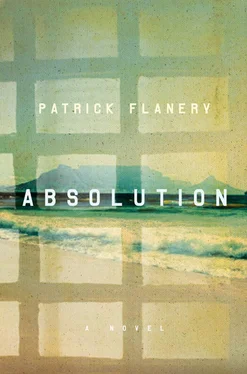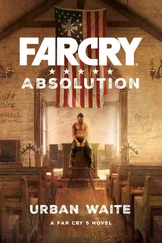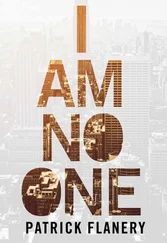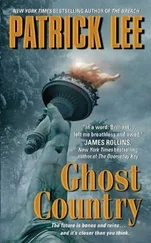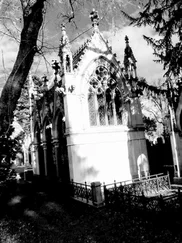I did not want to turn around to look but Nora’s body did. I knew already what Stephan Pretorius looked like in death. The stench of shit and urine that seared my nostrils billowed out from Nora’s lap, mingling with the smells of gunpowder and the gun’s oils, the odours of a crude beast created by the highest of animals — a beast with no place in nature.
The man with the gun then turned to Nora. As he took aim, I felt the bowels of the body I occupied loosen again, the liquid warmth continue to flow down onto the floor, and though I wanted to plead, to beg this man to pardon my sister, I could not make Nora’s mouth move, could force no sound to come out.
As I watched the man’s finger curl round the trigger, I woke alone in my own bedroom with the memory burning across my eyes of Nora’s destroyed face — a screaming pope disintegrating into darkness.
Such experiences can be explained in only two ways according to the logic by which I live, a logic which does not allow for the supernatural, though it was by the trappings of supernatural practice, my sham nekyia round the fire, that I seem to have occasioned these recent phenomena. The cause is either psychological, meaning that my own sense of guilt and complicity in evil acts has grown to the point that even my conscious mind is affected as if in a dream state. Or the cause is physical, and perhaps, in that case, the crueller of the two: the loss of my mind by the process of a self-annihilating dementia, though I am not aware of any other psychological abnormalities, memory problems or confusions, and the doctors have all pronounced me sound.
I can understand the allure of the supernatural. To explain your and Nora’s visits as a haunting, as the intrusion of a world beyond the physical one before me, would be the more comforting explanation. And in the absence of any other, it may be the one I am forced to believe.
*
Now that Sam has left me in peace for the foreseeable future, I set aside the last of your notebooks, Laura, my guide to the final weeks before your disappearance, the days you spent in the company of Sam. I turn instead to one chosen at random from the middle of the pile, wondering how it is possible that for twenty years I have left these ten volumes largely unread. It is not entirely true. At moments of greatest weakness and need and grief, I have picked one up, read a single page until I could not see clearly enough to read any further, and put them away again in the safe for months or years. Any hope I had that the books might provide clues to your whereabouts was overcome by my own selfish grief.
The notebook I take up now dates from the year you began working for the Cape Record . You had moved into the furnished flat above a shop on Lower Main Road in Observatory. On a typical morning you got up early to sit outside on the covered balcony, watching the traffic, people and cars, waving to the neighbours, calling out to them, a young white woman in a grey neighbourhood. (‘Don’t you want to live somewhere safer?’ you reported me demanding. Your retort: ‘I don’t want to live in deepest darkest suburbia like you.’)
Your father was giving you money to help make ends meet, though this was something I did not know at the time. I would have protested, said that you should first try to make a go of your life without our help, forgetting the way my own parents subsidized my itinerant years abroad, so much less focussed, so much more extravagant than you ever were, less noble in my aims. You wanted to tell the truth, I to fabulate and fabricate. In such a time and place, who better to support than you? You and your brother both inherited your father’s love of the truth. I cannot help seeing that as an indictment of my own professional lying.
After your morning coffee you showered, dressed in simple and unfeminine clothes, and went downstairs hoping your battered yellow Valiant would still be where you parked it the night before. (It was stolen once; your father helped you buy another, paid a former student to let you park it in his driveway a few streets away — another secret I did not know.) Each working day you drove fifteen minutes along Victoria Road and into the City Centre, parked, and went to your office.
At first, your editors only allowed you, young and recently finished with your degree at Rhodes as you were, to write obituaries. In the notebook you recorded brief sketches of your subjects:
A retired shopkeeper with three absent children, all emigrated to England. He had nothing but a crippled dachshund to keep him company. The dog will have to be destroyed because no one will take it in. I make the man over into a local prophet, exaggerating his importance and the effect of his death on the neighbourhood. Out of curiosity, I go to the funeral. Two of his children (snobs, but they grieve loudly; the son looks terrified by everyone he meets) come from London, and some old ladies from the street where the man lived. That’s it. Less than ten people at the funeral. Next time I should rather say the man was the second coming, not just a prophet, and then watch the crowds turn out.
Every morning you pored over the death notices. Some days you would arrive to find the night editor had flagged two or three that merited an obituary; on other days you chose for yourself, people of obvious local or national importance, but also others, like the former shopkeeper, men and women never thought important except by the few who knew and loved them.
In between the obituaries, your editor allowed you small general reporting assignments: human-interest stories, court reporting for minor local cases. The truth was, you enjoyed the obituary assignments and made the most of them. Families responded to you. You listened patiently and spoke politely, no matter the person you were addressing. You checked and tripled-checked the facts of the lives you wrote, and then made embellishments so the nobodies sounded even more important than they were (an inheritance from me, I like to think, despite your passion for truth). Families wrote expressing thanks for the quality of your notices and the managing editor joked that you should be employed to write nothing but obituaries, a scribe and chronicler of the dead.
A month into the job you met a woman who had gone back to work as a freelancer for the Record after having a child, who was now in school. She was older than you by nearly a decade, but on that first meeting the two of you discovered a connection.
‘I’m Ilse,’ she said, her dark eyes looking out from an even darker fringe of hair. ‘Have they let you out of the obits prison yet? Tell them you want the crime beat. That’s where the real news is.’
You told her your name and she crossed her arms over her chest and looked at you.
‘You’re Bill Wald’s daughter, aren’t you?’ The tone was more accusation than enquiry. She was tiny, a head shorter than you, but you felt intimidated by her, as though she were an older member of your own family.
You had never heard your father called ‘Bill’, but yes, you said, you were his daughter.
‘He was one of my professors, and a very good friend. I haven’t seen him in ages.’
You thought you recognized her from one of the garden parties your father always insisted on hosting for his Honours students. But that would have been years earlier. Before you knew what you were saying, it came out: ‘Yes, Ilse. I remember how fond of you Dad was.’
Is it possible that you knew, even then, that your father and Ilse had been lovers? I knew it, had known it for years with something like certainty, but you were only a child when she was his student, when the brief affair kept him away from home more than usual, then ended with no explanation and weeks of sulking from him. The next I heard, Ilse — I only ever knew her first name — had married another of your father’s students, and was pregnant.
Читать дальше
